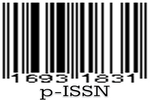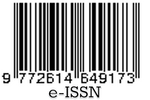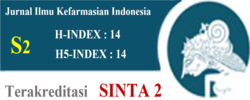The Role of Pharmacist in Increase on Medication Adherence of Tuberculosis Outpatients
Abstract
Our previous study showed that one of risk factor may lead treatment failure on tuberculosis was non adherence. The current research was carried out to fi nd the role of pharmacist in increasing on medication adherence of tuberculosis outpatients. A non-randomized controlled study was conducted at one of government hospital in Jakarta during April 2015 to July 2015 using MMAS-8. Total sample were 108 patients that divided each group of 54 patients into experimental group who had education and control group without education. Mean of age were 36.93 (SD=15.02) of experimental group and 38.12 (SD=15.11) of control group. More than 50% respondents were male with education level of senior high school. Control group had higher adherence in pre education than post education (P<0.05). Meanwhile, medication adherence in experimental group of pre education was signifi cantly diff erent with post education, 1.94±1.65 vs 0.54±0.64 (P<0.05). There was no diff erence signifi cant of adherence between experimental group and control group in pre education. Furthermore after patients education had been applied experimental group’s adherence had higher than control group (P<0.05). The fi nding of the study may lead that impact of patient education by pharmacist result in better medication adherence.
References
2. Jakubowiak W, Bogorodskaya E, Borisov S, Danilova I, Kourbatova E. Treatment interruptions and duration associated with default among new patients with tuberculosis in six regions of Russia. Int J Infect Dis. 2009.13(3):362-8.
3. Keban SA, Restinia M, Hutagaol L. Factor of therapeutic failure among outpatients of tuberculosis. International Journal of Pharma Sciences. 2014.4(6):834-8.
4. Hutagaol L, Keban SA, Restinia M. Evaluasi faktorfaktor penyebab kegagalan terapi pasien TBC di RS Cipto Mangunkusumo. Dipresentasikan secara oral di seminar nasional kefarmasian “Peran farmakoekonomi dalam pelayanan kefarmasian” pada 11 Oktober 2014 di Hotel Aria Barito Banjarmasin. 5. David P. The eff ectiveness of educational methods on medication adherence in African American [dissertation]. Walden University. 2015.
6. Silva NL, Ribeiro E, Navarro JL, Zanini AC. Compliance with treatment related-issues and insight for pharmacist intervention. Brazilian Journal of Pharmaceutical Science. 2011.47(1).
7. Eticha & Kassa. Non-adherence to anti-TB drugs and its predictors among TB/HIV co-infected patients in Mekelle, Ethiopia. J Bioanal Biomed. 2014.6:61-4. Doi:10.4172/1948-593x.1000113.
8. Burge S, White D, Bajorek E, Bazaldua O, Trevino J, Albright T, et.al. Correlates of medication knowledge and adherence: Findings from the residency research network of South Texa. Family Medicine. 2005.37(10):712-8.
9. Ubajaka CF, Azuike EC, Ugoji JO, Nwibo OE, Ejifora OC, Modebe IA, et.al. Adherence to drug medication among tuberculosis patients in a tertiary health institution in South East Nigeria. International Journal of Clinical Medicine. 2015.6:399-406.
10. Bhardwaj A, Kumar R, Dabas V, Alam N. Assessment and enhancing adherence to treatment regimen in tuberculosis outpatients. International Journal of Pharmacy and Pharmaceutical Sciences. 2012.4(3).
11. Chimbanrai B, Fungladda W, Kaewkungwai J, & Silachamroon U. Treatment-seeking behaviors and improvement in adherence to treatment regimen of tuberculosis patients using intensive triad-model program, Thailand. Southeast Asian J Trop Med Public Health. 2008.39(3):526-41.
12. Daniel Hu, Deborah TJ, Michelle Y, & Theresa PC. Interventions to increase medication adherence in African-American and Latino Populations: a literature review. Hawai J Med Public Health. 2014.73(1):11-8.
13. Prasetyo YA, Preechawong S, Yunibhand J. Eff ect of a tuberculosis health promotion program on medication adherence among tuberculosis patients. J Health Res. 2014.29(1):47-53.
14. Kaona FA, Tuba M, Siziya S, & Sikaona L. An assessment of factors contributing to treatment adherence and knowledge of TB transmission among patients on TB treatment. BMC Public Health. 2004.4:68.
15. Kebede A, & Wabe NT. Medication adherence and its determinants among patients on concomitant tuberculosis and antiretroviral theray in south west ethiopia. N AM J Med Sci. 2012.4920:67-71.
16. Morisky DE, Green LW, Levine DM. Concurrent and predictive validity of a self-reported measure of medication adherence. Med Care. 1986.24:67-74.
Licencing
All articles in Jurnal Ilmu Kefarmasian Indonesia are an open-access article, distributed under the terms of the Creative Commons Attribution-NonCommercial-ShareAlike 4.0 International License which permits unrestricted non-commercial used, distribution and reproduction in any medium.
This licence applies to Author(s) and Public Reader means that the users mays :
- SHARE:
copy and redistribute the article in any medium or format - ADAPT:
remix, transform, and build upon the article (eg.: to produce a new research work and, possibly, a new publication) - ALIKE:
If you remix, transform, or build upon the article, you must distribute your contributions under the same license as the original. - NO ADDITIONAL RESTRICTIONS:
You may not apply legal terms or technological measures that legally restrict others from doing anything the license permits.
It does however mean that when you use it you must:
- ATTRIBUTION: You must give appropriate credit to both the Author(s) and the journal, provide a link to the license, and indicate if changes were made. You may do so in any reasonable manner, but not in any way that suggests the licensor endorses you or your use.
You may not:
- NONCOMMERCIAL: You may not use the article for commercial purposes.
This work is licensed under a Creative Commons Attribution-NonCommercial-ShareAlike 4.0 International License.





 Tools
Tools





















